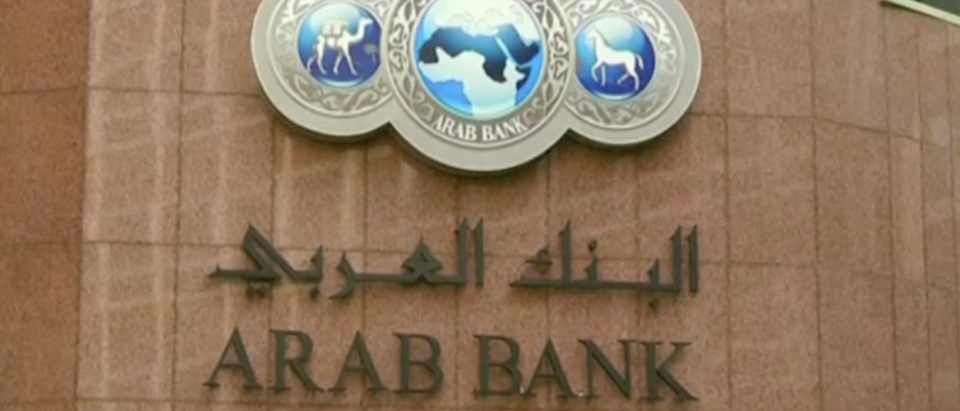The U.S. Supreme Court appeared divided Wednesday as to whether a corporation can be sued in an American court for human rights violations, though signs of a compromise emerged during the argument.
The case before the justices was brought by some 6,000 Israeli victims of terrorism against a Jordanian financial institution called Arab Bank, which processed hundreds of payments to terrorists and funneled money from financiers in Saudi Arabia to the families of Palestinian suicide bombers. The plaintiffs brought their suit in the U.S. because the bank’s New York branch administered many of the payments — and because they can collect much larger damages in an American court.
A law adopted by the first Congress in 1789 called the Alien Torts Statute (ATS) allows U.S. courts to hear cases involving foreign nationals for “violation[s] of the law of nations or a treaty of the United States.” The high court, however, has never expressly stated that corporations may be sued under this law, the crux of the controversy before the justices Wednesday.
Human rights advocates say the ATS is an essential vehicle for corporate oversight and accountability. EarthRights International, an activist group which filed an amicus (or “friend-of-the-court”) brief in the case, says the law “allows victims of egregious human rights abuses committed abroad to sue those responsible in U.S. federal courts.”
Early in the argument Chief Justice John Roberts and Justice Samuel Alito expressed concern about the diplomatic consequences attending ATS suits against corporations. The pair suggested that allowing ATS corporate liability would entangle courts with foreign policy, a role for which they are uniquely ill-suited.
“I’m wondering if extending it to corporate liability is, in fact, going to have the same problematic result of increasing our entanglements, as it obviously has here with respect to the government of Jordan,” the chief said.
He later wondered why American courts in particular were appropriate venues to adjudicate violations of international law.
Jeffrey Fisher, the lawyer for the victims, countered that other legal rules exist to help the courts navigate diplomatic friction.
He also emphasized that, under the bank’s theory of the ATS, a foreign national could not sue an American corporation for a human rights violation that took place in the U.S.
Justice Elena Kagan seized on this point, later asking the bank’s lawyer, Paul Clement, if a foreign national enslaved by an American corporation while in the United States had any recourse to sue the company under the ATS.
“So, there is an American corporation,” she said, beginning her hypothetical. “So the defendant is an American corporation, and it uses slave labor, and it uses slave labor of people in the United States, [and] all the work is done in the United States.”
“[Y]ou’re saying that there shouldn’t be ATS liability against the corporation in that circumstance, even though they are using slave labor…and even though in our domestic system the method of enforcement we usually use is corporate liability.”
Clement replied that the law would permit such a victim to sue individual corporate officers but not the company itself. Alito added that other legal avenues exist to hold the company to account, like criminal prosecution, though Kagan pointed out such recourse would not allow the victims to recover damages.
Justice Stephen Breyer said that corporate liability exists in certain international conventions to which the U.S. is a signatory, which would indicate that the U.S. long ago agreed that business entities may be sued in domestic courts for violations of international law. Clement countered that only six treaties explicitly allow corporate liability. The U.S., he added, is not a signatory to any of them.
Clement elsewhere asserted that the facts of this case do not seriously implicate the United States. A 2013 Supreme Court ruling requires that ATS lawsuits touch and concern the territory of the United States with “sufficient force.” The bank says no such nexus exists in this case, as its New York branch merely served as an electronic clearinghouse through which payments passed.
The U.S. government was sympathetic to this portion of Arab Bank’s argument, though it believes corporate liability exists within the ATS. Assistant to the Solicitor General Brian Fletcher, a government lawyer who appeared briefly before the Court in support of neither party, said it was not clear that this case sufficiently implicates the U.S. He also called on the justices to specifically identify which international law violations an American court could hear in an ATS case.
Kagan appeared sympathetic with this point, and elsewhere in the argument said the bank has “plenty of things to gripe about,” in this case. Her comments raise the possibility that the justices could reach a compromise, concluding this case may not proceed in an American court given its weak connection to the U.S. while saving the question of corporate liability for another day.
A decision will come by June of 2018.
Disclosure: The writer’s fiancee is employed by a firm involved in this litigation.
Send tips to kevin@dailycallernewsfoundation.org.
All content created by the Daily Caller News Foundation, an independent and nonpartisan newswire service, is available without charge to any legitimate news publisher that can provide a large audience. All republished articles must include our logo, our reporter’s byline and their DCNF affiliation. For any questions about our guidelines or partnering with us, please contact licensing@dailycallernewsfoundation.org.


